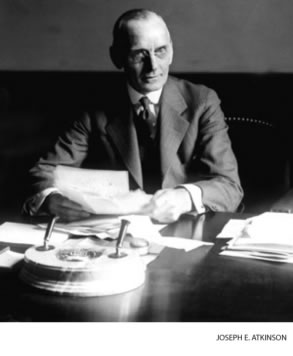
Beland Honderich: Keeper of the Atkinson Flame
his article originally appeared in the Toronto Star on Nov. 9, 2005.
From the beginning, Beland Honderich never forgot the small person's struggles in life. Every day, the crusading Toronto Star publisher stoked the fiery blast furnace that was his newsroom at 80 King St. W. and waged battles on their behalf.
Words by the thousand were written, argued over, edited and honed - and then fed into the maw of the aging presses thundering below, causing the Star building to shudder and moan.
And when the newspaper hit the streets - with words transmuted into pages of hard-hitting stories and pithy editorials - those who afflicted the weak and vulnerable had every reason to shudder and moan, too.
Honderich was the muscle and bone of the modern Star, a stern and exacting publisher who sought to create a special bond with readers, taking their needs and interests to heart. During his 52 years at the Star - from financial reporter to chairman of Torstar Corp. - he adhered to the liberal principles of founder Joseph E. Atkinson, a champion of Canada's social welfare system and crusader who sought to make life better for all.
Honderich was The Keeper of The Atkinson Flame. And he, too, became a titan of Canadian journalism.
"I believe newspapers should play an activist role in society, and not content themselves with reporting events. For events alone do not properly reflect what is taking place in society," Honderich told a Carleton University audience in Ottawa in 1989, explaining how newspapers have the power to change society.
"We know, for example, that the distribution of income continues to be skewed in favour of the wealthy. Despite all our welfare services, there continues to be a real need and even suffering in our midst.
"Without food banks in Toronto, many people would not have enough to eat. Adequate housing is beyond the reach of low-income families and the situation is getting worse.
"What attention do these subjects deserve in our newspapers?" Honderich asked rhetorically.
"Newspaper editors - and I include those at the Star - need to get out of their offices and find out how people are really living. For only when the public is made aware of these deplorable conditions will public opinion force our governments to find solutions."
The underpinnings of the Star's editorial policies were laid down by Methodist Atkinson when he took over the starveling Evening Star in 1899. The radical liberal journalist, assisted by his wife, Elmina Atkinson, was determined to help end the heartless conditions of the age and build a Canada where everyone was free from want ; where class and privilege were swept away and wealth was more fairly distributed among the populace.
"Prosperity must bless all," said Atkinson in the early 1900s, adding that dignity, proper housing and jobs, plus pensions and health care, should be the right of everyone in horse-and-buggy Toronto.
Honderich agreed with the sentiments and unabashedly, even ruthlessly at times, championed those same liberal principles that still guide the paper today, more than a century later. Stories initiated by Honderich challenged anti-Semitism, exposed discrimination, and spotlighted the pressing need for more thoughtful attention to the education of poor children and thus provide them with a hope-filled future.
Town hall meetings thrashed out contentious city issues. Star-commissioned polls highlighted societal failures - and their findings became grist for features, investigative reports, analysis pieces, and editorials that expressed a clear point of view - the Star's point of view.
"Reporters and editors will strive to be as fair and accurate as possible. But the paper's value system - its point of view of society - will still prevail," Honderich said in 1989. And he never deviated from this stand.
A purist in the art of hands-on management, Honderich also emulated his hero's methods of running the Star.
A man of extraordinary personal discipline, Honderich rose before daybreak and assiduously read The Globe and Mail and The Telegram, monitored CBC radio news, and then crawled through piles of Star galley proofs, checking facts and pencilling terse questions and comments, such as "Why?", "Explain!" or "Make the lead."
Many editors were decidedly nervous when he phoned the newsroom, sometimes as early as 6 a.m., with questions or explicit instructions. The demanding publisher nearly always got what he wanted, often at great cost to managing editors, who considered two years in the job as pretty good.
When Honderich spoke, there often was an indefinable menace in his tone and he wasn't afraid to bang heads, as many knew to their cost when he became editor-in-chief in 1955. He single-handedly saved the paper from self-destruction, and slowly and painfully dragged it kicking and screaming out of the razzle-dazzle era of the 1940s and 1950s - a swashbuckling era when some reporters "juiced up" their stories and made no bones about it. By 1966, he was publisher - at age 48 - and remained in power for 22 years. Editors came to understand that he deplored sloppy writing; editorial page banalities; poorly argued opinion pieces; over-the-top news stories, and screaming headlines.
He demanded excellence, accuracy and fairness. He wanted the paper to again reflect the concerns of the ordinary person, even if it became a little greyer, a little less "fun" to read.
"I am proud of the role that the Star has played in fighting for laws against discrimination, for medicare and old-age pensions, for the rights of individuals, and for economic policies that provide greater hope for the neediest members of society," he said when chairman of Torstar Corp., and able to reflect on his career that started in 1943 in the Star's King St. W. skyscraper, and ended at the One Yonge St. offices by the harbour.
"I would like to think that during my years as publisher, we played a part in making this a fairer and better society - because we reflected a point of view."
Mike Pieri is a retired Star senior editor.
